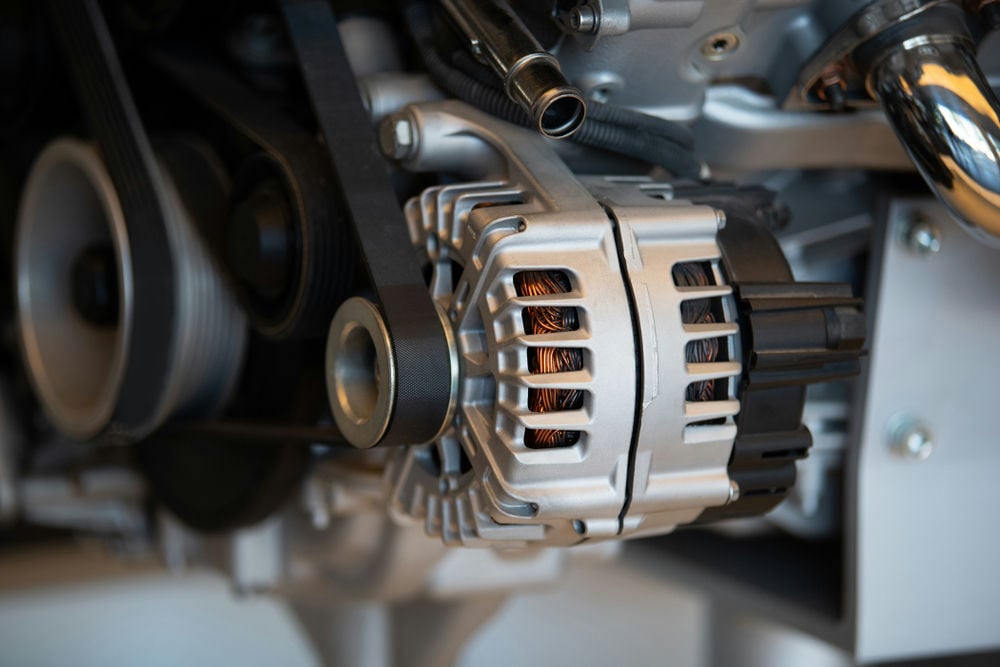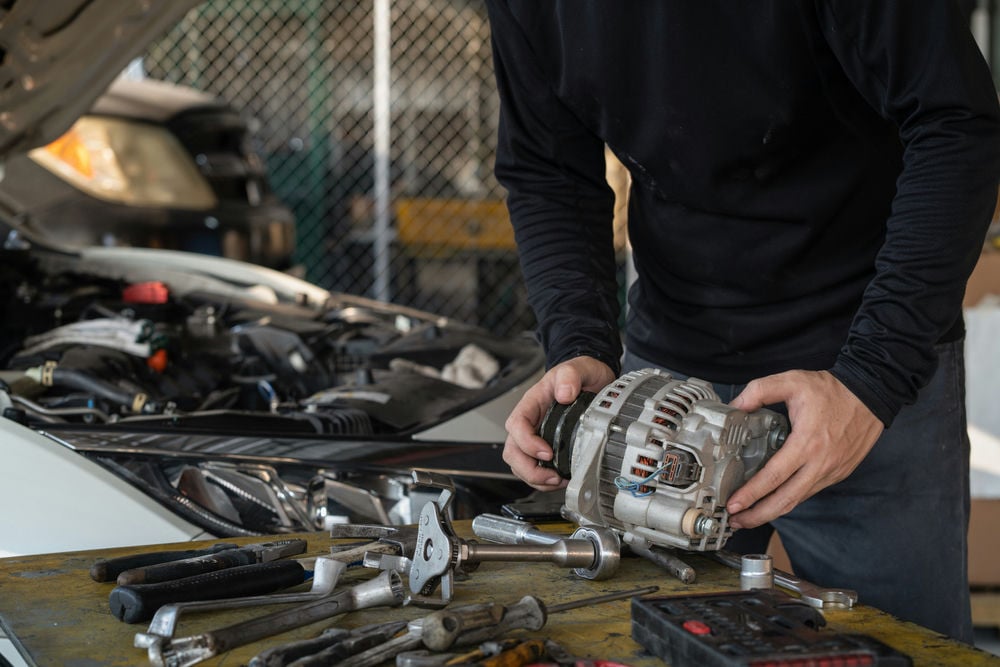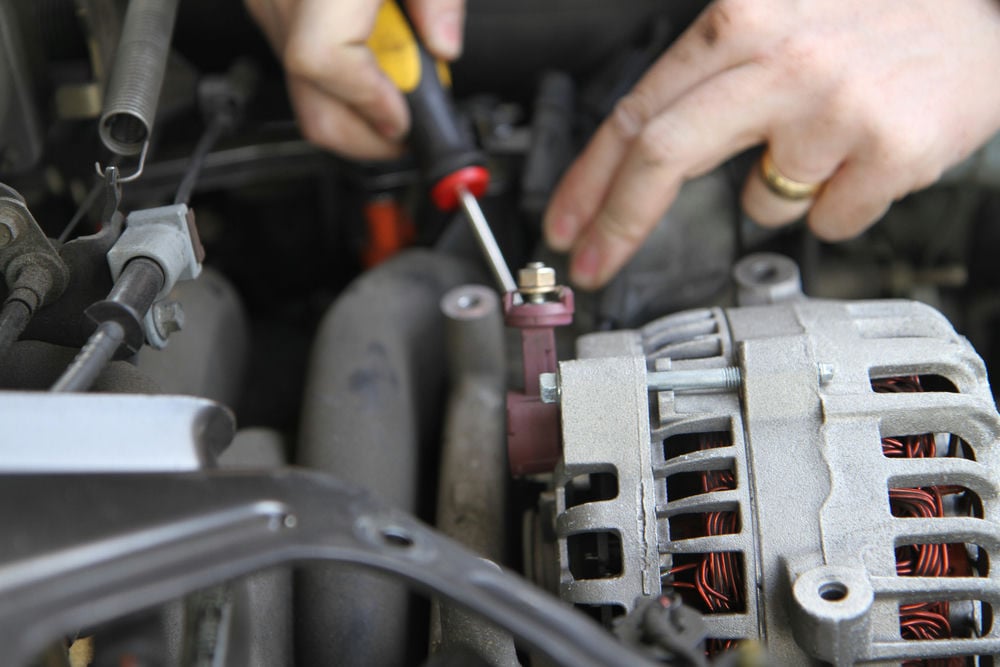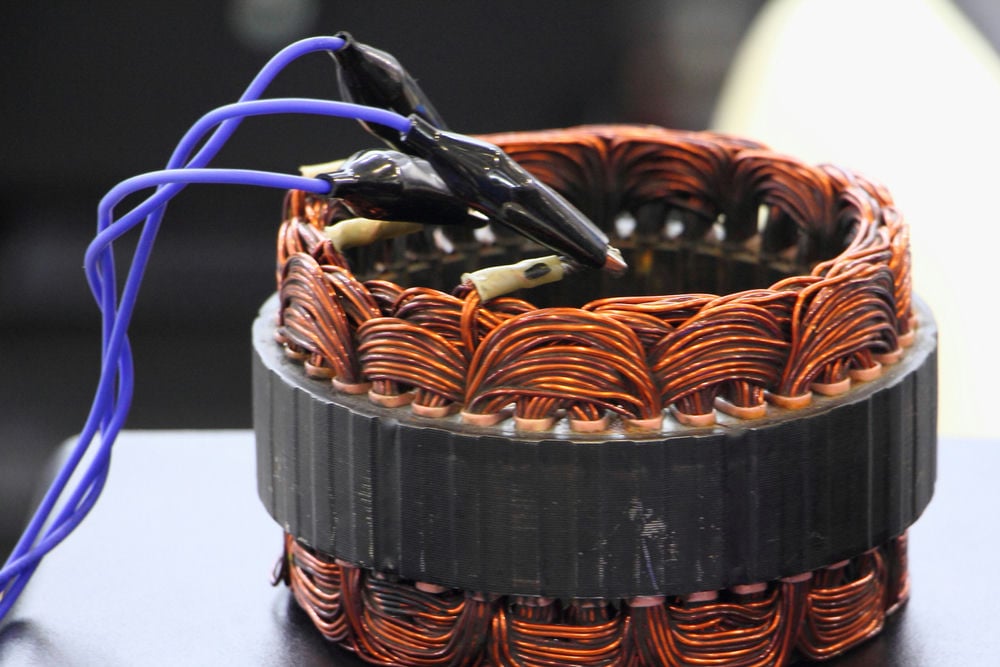There are several potential reasons your car may have a rough idle,
including a faulty alternator.
A failing alternator can cause a rough idle from your car because it
powers your ignition system and can cause a lack of power to the spark
plugs. The alternator also powers your car's electronics, including the
sensors. Sensors not getting enough power can throw off the engine
timing and fuel mixture.
Your car can't run right without a good alternator. Keep reading to learn
more about what it can affect and why it's so important.
 The secondary effects of a bad alternator may cause a rough idle.
The secondary effects of a bad alternator may cause a rough idle.
Can A Bad Alternator Cause The Engine To Shake?
While it's not a common symptom of a bad alternator, your engine may still
shake if the part is going bad.
There are a few reasons why this could happen. One reason is that the
alternator pulley could seize up, causing vibrations in your serpentine
belt.
When the engine runs, the alternator is powered by a pulley turned by your
car's serpentine belt. Unfortunately, this pulley can sometimes fail, which
will cause it to stop spinning freely.
If this happens, it can cause your serpentine belt to vibrate as it
struggles to turn the seized pulley.
This vibration can make it feel like your whole engine is shaking since the
serpentine belt is connected to several components of your engine block.
Another way your alternator can cause the engine to shake is due to
misfiring spark plugs.
The alternator powers your ignition coils, which create the power needed
for your plugs to spark and burn the fuel in each cylinder.
If the coils aren't getting enough power from the alternator, it will cause
a lack of spark in the plugs.
This will cause the engine to begin misfiring, and a misfire can cause your
engine to shake.
 A mechanic preparing to install a new alternator.
A mechanic preparing to install a new alternator.
Can A Bad Alternator Affect Engine Performance?
A faulty alternator will affect your car's engine performance.
Your alternator provides power to your electronics whenever the engine is
running. This includes the engine computer, ignition system, and the car's
sensors.
Without power being supplied to all of these critical pieces of your
engine, there's no way for it to function the way it's supposed to.
If you've ever experienced an alternator going wrong in the middle of a
trip somewhere in your car, you already know how quickly it will cause your
engine to shut down.
After the first telltale signs of the lights dimming and the radio shutting
off, it's usually only a matter of minutes before the engine loses its
ability to run normally and quits working entirely.
Can A Bad Alternator Cause Your Engine To Misfire?
As stated above, engine misfires are a sign of a bad alternator.
If the alternator stops providing power to the ignition coils for your
spark plugs, then the plugs won't be able to create enough spark to ignite
the gas being sent to the cylinders.
The alternator also powers your engine computer, which controls the order
in which the spark plugs fire.
The engine timing relies on the spark plugs firing in a specific order to
keep everything moving correctly.
If the spark plugs fire out of order, it will also cause misfiring in one
or more cylinders since the pistons won't be in the correct position when
the plugs attempt to spark.
 A mechanic installing a new alternator.
A mechanic installing a new alternator.
Why Is My Engine Shaking When Idling?
Your engine can shake during idle for several different reasons:
-
Incorrect ignition timing:
If the ignition timing isn't set correctly, it can cause the engine to
shake or vibrate.
-
Worn or damaged spark plugs:
Spark plugs that are worn or damaged can cause misfiring, which can cause
the engine to shake or vibrate.
-
Worn or damaged engine mounts:
If the engine mounts are worn or damaged, it can cause the engine to
vibrate excessively.
-
Misfiring cylinders:
If one or more cylinders are misfiring, it can cause the engine to shake or
vibrate.
-
Vacuum leak:
A vacuum leak can cause the engine to run lean, which can cause it to shake
or vibrate.
-
Clogged fuel filter:
A clogged fuel filter can cause the engine to run lean, which can cause it
to shake or vibrate.
Does The Alternator Cause Vibration?
It's unlikely that an alternator would cause your engine to vibrate.
The alternator is responsible for generating electricity to charge the
battery and power the vehicle's electrical systems, and it's only connected
to the engine via the serpentine belt.
A faulty alternator pulley is usually the only part of the alternator that
would cause vibration by itself.
However, a malfunctioning alternator could cause other issues that might
result in the engine vibrating.
Generally, an alternator is not likely to cause engine vibration. Many
other potential causes of engine vibration are more likely to be the source
of the problem.
 A mechanic testing an alternator.
A mechanic testing an alternator.
What Are The Signs Of A Weak Alternator?
There are several signs that you may have a weak alternator or a
malfunctioning charging system:
-
Dim headlights:
If the alternator isn't producing enough power, the headlights may appear
dim or flickering.
-
Dead battery:
A failing alternator won't be able to charge the battery, which will
eventually cause the battery to go dead.
-
Engine stalling:
Since the alternator powers the ignition system, it can cause the engine to
stall if it isn't generating enough charge.
-
Electronic failure:
If the alternator is not producing enough power, it can cause electronic
components such as the power windows or radio to malfunction.
-
Warning light:
Most vehicles have a warning light on the dashboard that indicates a
charging system problem. If this light comes on, it could indicate a weak
alternator or other charging system issue.
It's always a good idea to have a mechanic diagnose any issues with your
alternator or charging system to determine the cause and recommend the
necessary repairs.
Ignoring a problem with the alternator or charging system can lead to more
serious issues and potentially cause your vehicle to break down.
Conclusion
Since your alternator is responsible for providing power to your car's
ignition system, it can be a potential culprit if you're experiencing a
rough idle.
Your alternator will usually give you plenty of warning signs if it's
starting to go bad, so if you suspect this is the case, you should check
your car out as soon as possible to avoid getting stranded with a dead
battery.